Marnie McBean's Blog, page 5
June 6, 2019
Expectation is it the Enemy of Play? (Is Experience the Enemy of Joy?)
Posted in What I'm thinking (Thoughts and opinions)
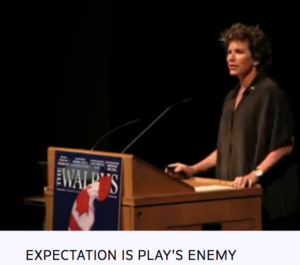
In the past – I was asked to give a Walrus Talk. The theme that the speakers were given was simply “Play”. I could do anything I wanted to from there.
I knew I could have addressed the value of play in the way that structured-play is used by Right to Play around the world to build communities. They use play to educate and empower children and youth to overcome the effects of poverty, conflict and disease in disadvantaged communities. Through Play one can teach important lessons such as disease prevention (HIV, Malaria, and other waterborne illnesses) and inclusion of those are living with those illnesses.
I could also have discussed the importance of more unstructured-play for kids (and adults!) in our own communities. Our overly scheduled and observed lives leave less and less room for our imaginations and/or creative problem solving.
But I decided to address the play that should exist in, but to often is missing from, our work.
We all work. Whether that be in the form of a job from which we earn a paycheque, or work as school, sport, raising a family… I don’t believe that work should always feel like a burden or a grind, there should be (must be?!) some part of it that is enjoyable – and even fun. The people, what you get from it (intrinsic), what you get for it (altruistic), the mere act of doing or completing a task.. on any given day it might be different, but when we can recognize some element of what we are doing as enjoyable and even playful – the quality of not only our work – but of our lives goes up exponentially.
For my Walrus talk on play, I spoke about about my Olympic bronze medal, the one of four Olympic medals that I have that is not gold. I shared my observations that what was missing from that race was joy.
Play can exist in the hardest most challenging things that we are doing. It doesn’t have to be all skipping and smiles, it can be as competitive and focused as you choose. Try not to feel burdened by the expectations that come with work, but rather lifted and inspired by those expectations. Learn to frame joy and play as YOU like it.
It’s only 7 minutes… well – okay – I failed there… It’s about 11minutes, but it’s fairly short and to the point.
February 16, 2019
Meet Special Olympics Team Canada 2019 Honorary Coach: Three-time Olympic gold medalist Marnie McBean
Posted in Marnie in the NewsMentor Messages
An In the Spotlight interview on the Special Olympics Canada website
 Marnie McBean and daughter Isabel with Special Olympics Team Canada soccer player George Ricardo.
Marnie McBean and daughter Isabel with Special Olympics Team Canada soccer player George Ricardo.Canadian rower and three-time Olympic gold medalist Marnie McBean has passed on her expertise as an official Team Mentor to Canadian athletes at five Olympic Games and two Pan American Games.
The Olympic champion is gearing up for her latest leadership role as Honorary Coach for all 109 athletes on Special Olympics Team Canada for the Special Olympics World Games Abu Dhabi 2019, taking place in the United Arab Emirates March 14 to 21.
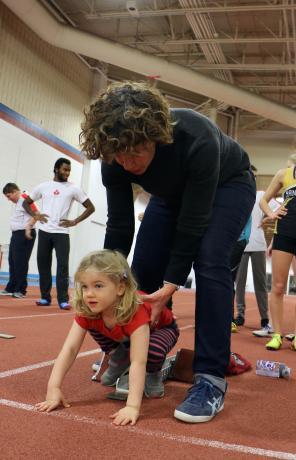 Marnie McBean and daughter Isabel participate at a Team Canada training camp.
Marnie McBean and daughter Isabel participate at a Team Canada training camp.“I really want to bring my experiences of working with generic, high performance athletes and continue that on and pass the same knowledge through to the Special Olympics athletes,” McBean said. “They have the same fears and doubts and confidences that any other athlete I’ve ever worked with has.”
While it’s McBean’s first time as Honorary Coach at the Special Olympics World Games, she’s been involved with the movement since the early 1990s.
According to McBean, once she started to bring home medals from the Olympic Games, she was asked to attend a lot of events – and Special Olympics Canada events were her favourite, because she loved meeting the athletes.
“That sort of interaction always made it just so lovely and real,” she said. “I got to see them and their joy and as much as I was being asked to come and share my medals and my experiences – they were always super quick to share their medals and their experiences too.”
As Honorary Coach, McBean – with 3-and-a-half-year-old daughter Isabel in tow – has visited a number of Special Olympics Team Canada training camps over the past few months to offer words of wisdom as athletes prepare for the world stage.
She’ll also be in Abu Dhabi for the nine-day competition, offering inspiration, insight and, of course, to cheer on the team.
With less than 30 days until World Games kick off, McBean has three main messages for the team:
1. YOU ARE THE ROLE MODELS NOW.
In every speech she’s given so far, McBean assured Team Canada athletes they no longer need to look to the Champions Network – a group of Canadian celebrities and professional athletes, including McBean, who help promote the movement – for inspiration or guidance.“They are becoming their own Champions Network – they are community role models now,” she said.
2. FOCUS ON CONFIDENCE.
“For the last year or more they’ve been working on their competence and looking at all the things they need to do better,” McBean said.
But now is the time to shift that perspective.
When they arrive in the UAE, Team Canada will look at their competitors and notice everything they’re doing right, she said, so they need to do the same for themselves.
“An ambitious person will always feel that there’s more to do,” she said. “That’s good to think when preparing, but a bad thing to think in the middle of a competition.”
“From now through to the Closing Ceremony, the consistent message will be to focus on our confidence and everything that we’re doing right – because we are prepared.”
3. ENJOY THE EXPERIENCE.
McBean cautioned athletes not to have “blinders” on while in the UAE.
“Have fun and be eyes open and meet people,” she said. “Take in the experience of travelling all the way to Abu Dhabi – there’s a lot to be taken in in a non-sport sense.”
February 13, 2019
Do you look for solutions to problems or problems to solutions?
Posted in Mentor Messages
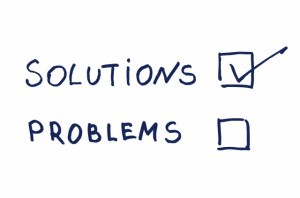 Do you look for solutions to problems or problems to solutions?
Do you look for solutions to problems or problems to solutions?In many different ways I’ve written about being open to new ideas and change. In my book I shared a story about snowboarding through a gladed run. This particular story spoke of the importance of looking and moving to the spaces around the problems and not looking at the problems themselves. If you want to hit the trees, I concluded – look at the trees. If you want to ‘hit’ the fresh powder, well then …(For that full story click here, but I’ll also put a link at the end of this message.)
Previous to this post, I’ve also written about the value of being young and naïve vs. well seasoned and experienced. I have found that it’s not uncommon for experience to sometimes act as a burden when it comes to problem solving. When we think we know it all we start to become those who know less and less. At some point, because of our experiences, we inadvertently become closed off to challenge of new or changing ideas. That’s when we hear from others, or think to ourselves, “I’ve been doing it this way for X number of years – why would I / should I change?” Our well-honed routines provide us with the comfort that we know what we are doing but they put us at risk for becoming less curious about what we could be doing differently.
So, I come back to my opening remark; do you look for solutions to your problems, or do you find yourself finding problems in your solutions?
This isn’t the type of message where I offer an easy fix-all solution. There isn’t one. It is simply a question that I ask of myself, and I am suggesting that you ask it of yourself. I believe that simply this act of self-reflection will lead you to do a bit of both, which is, in my humble opinion the right way to go. In order to perform at any efficient level you must be looking for solutions to problems but you also must have a sense of what problems might arise.
Having an idea that a problem might present itself is much different than assuming that a problem will present itself. The former allows you to anticipate change and challenge; the later leaves you unwilling to change at all.
Before I sign-off – another self-reflective question; (and it’s one of my favourites!) In conversation do you listen, or do you wait to talk? !
Previous posts on being open to new ideas.
See the Spaces – an excerpt from The Power of More
February 6, 2018
Are you ready? Ready is relative.
Posted in Mentor Messages
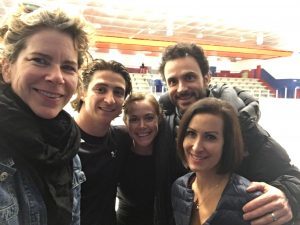
On approach to their 3rd Olympics : Me with Scott Moir, Tessa Virtue and their coaches Patrice and Marie-France (who I mentored in 2006!) What a team!
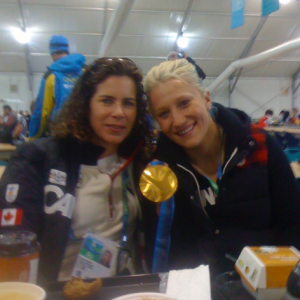
I met Kaillie at the 2006 Olympics – a 1st Winter Games for both of us… Now she’s at her 4th, going for 3rd gold.
With the 2018 Olympics starting soon, I’ve found myself in a recurring conversation with athletes who are about to test years of their preparation against the World. Most of the athletes I’ve been talking with are going to their 3rd and 4th Olympics; they are successful and experienced veterans and yet they are troubled by the question “Are you Ready?”.
The question isn’t a conundrum for just Olympians… it’s one that – in the presence of ambition – will (should?!) always circle back on you…..
So how many times do you get asked – Are you ready?
– Is the answer you give the same one that’s in your head? Ready is relative.
Consider the Dunning Kruger Effect. It says….
If you ask an incompetent person “Are you ready?” or “Do you know enough?”- because they are incompetent and they believe that what they know is everything – they will tell you, AND believe, that they are as ready as they could possibly be.
On the other end of Dunning Kruger scale…
If you ask a competent person “Are you ready?” or “Do you know enough?”- because they are competent, and know how much there is to know – they can’t say and BELIEVE that they are as ready as they could possibly be. (Consider – I imagine that if you ask Stephen Hawking what he knows about the universe – he will tell you that he knows almost nothing. )
That said –
yes – You are ready. You are as ready as you need to be to be your best. To Nadia Comaneci – her perfect “10” routines in Montreal were anything but perfect. That’s how your ambition and drive works for – and against you. Believe in perfect, let the idea of being perfect go. Be your best.
When you look at others – I would expect that you see them as ready. even more – you see them as Olympic ready.
This is how they see you.
You are ready.
October 23, 2017
Be Extraordinary – Western Alumni Gazette – A chat with Marnie
Posted in Marnie in the News
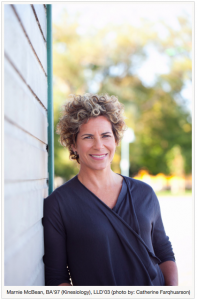 A chat with Marnie about Performance and Winning
A chat with Marnie about Performance and Winningby Jason Winders, MES’16, PhD’16 | October 13, 2017
One of the most decorated athletes in Canadian history – most notably as a three-time Olympic gold medalist – Marnie McBean, BA’97, LLD’03, shares what she learned from a life on the water at Western and beyond.
My ultimate thing was not to win, but to get better. Getting better all the time meant attention to detail, to learning, to figuring things out. And all that – that attention to things – took care of winning.
I was not a star athlete. I always made teams. But I was never the star. I was not a scorer or a playmaker. I was a grinder who moved things along. But I have come to understand that everyone is excellent at something; it is the lucky few who find what that is.
I had great water feel. I wasn’t a great rower at the beginning, but somebody saw something about me on the water. And that was me – it was being on the water, how rowing boats moved, knowing how a team moved together. I loved it from the first day.
Get a feel for your water. I cannot hit a three-pointer. I don’t have that kind of coordination. But I have water feel.
When you find that thing you are great at, it is easy to put time into it. It will always feel like a choice. It will always feel like you are choosing to be more.
Every day won’t be perfect. There were days I wanted to quit. But, at the end of those days, I ended up loving it more. The number of times I woke up and didn’t want to get out of bed – maybe it was a crappy day out, pouring rain. But I did get up because I had an obligation to my crew waiting at the lake. And after those two-hour rows, I came in saying they were the best rows ever.
Don’t expect your motivation to come from the same place every day. On some days, commitment doesn’t come from the fact you love it. On some days, it comes from obligation. On some days, it comes from the fact I love to win. On some days, it comes from the fact I hate to lose.
Loving to win is different than hating to lose. There is a thrill to winning – that comes from pushing. Hating to lose comes from being pulled. With hating to lose, you are using the people around you to motivate you. You are not going to let them beat you. That comes more from ego.
Understanding and accepting that any day can be a good day, but might also be a great day or be a bad day. On great days, you are out there to win. On bad days, you are trying hard not to lose.
Train for the bad days. Real champions are the ones who dig down when they are competing terribly. That stubborn determination does not let the bad days take over.
You can train your mind the same way you train your body.
I came home from Barcelona – I was only 24 – and a journalist asked me, ‘OK, Marnie, you are an Olympic champion. How will you ever top this?’ I remember staring at him. That was the saddest question I ever heard. I had never thought to limit myself. I had never thought that I had come to the end of my journey.
There is always so much to learn. Once you have achieved everything you wanted to in your career, what does that mean? Are you done? If you achieve your five-year business plan, does that mean you close in year six? Of course not. You have to come up with a new plan. You become a bit visionary. What motivates me on a daily basis is learning, being curious. There is so much left to learn.
There are thousands of things that you can do wrong in any given rowing stroke – there are thousands of things you can do right, as well. If you can come to grips with that as your motivation, then it doesn’t matter what you have achieved. So, as soon you achieve your personal best time, you’re instantly thinking about every bit you did wrong, thinking you could have been a second faster, a stroke better.
When someone asks me what I am going to do next, I know that is a ridiculous statement. There is always room to improve.
Surround yourself with people who are committed to the same lifestyle you are, who have a commitment to work hard.
You are always tightest with your crew. Your boat is your immediate family.
This article appeared in the Fall 2017 edition of Alumni Gazette
February 27, 2017
Rookie, Established or Veteran – Seeing Your Self as a Champion Takes Practice
Posted in Mentor MessagesWhat I'm thinking (Thoughts and opinions)
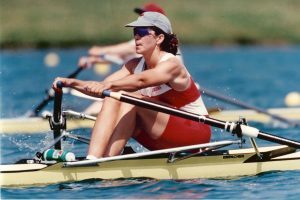
Focusing on task, improving technique and increasing strength are what keeps us in the up-curve of our careers.
Take a moment to picture a champion in your field, a person who achieves success often. See this champion doing something you admire: now see this champion smiling, shaking hands….
What do you see? I’ve always seen confidence, talent (not sure how one sees this, but it’s a feeling I get), good strong posture, and a twinkle in the champion’s eye – as if this champion knows a secret.
Now… here’s an important question – Was it you that you saw? Do you see yourself as a champion?
Maybe you saw a generic person – no one in particular – that’s fine — but could it have been you? (This is possibly a very “Canadian” way to picture success considering how we tend to think of who our “heroes” and role models are. ie – we tend to use composites of people and traits). So. Do you posses the characteristics that you saw? Do you hope to? Are you working on them?
Here is a telling follow-up question, especially if you are a woman — if it wasn’t you – did you picture a woman?
It’s not easy to be that bold, but ego is not arrogance.
When I first started thinking about actually going to Olympics – when I pictured an Olympian, in my mind I saw a male swimmer. He was sort of a perfect specimen – tall, broad-shouldered-narrow-waisted, hairless (?ha!), and almost zero fat on his body. I am none of these things so how could I become an Olympian?
But “he” was the example that our culture kept feeding me. While Canadian women did win medals, male champions tended to be lionized. Sport is one of many fields where coverage of it is skewed towards the male bias whether the field is male dominated or not. In rowing it was even harder to picture role models that I could identify with. It wasn’t just Canadians that struggled to win gold medals; it was ALL western nations. What I wanted to do hadn’t been done by someone like me…yet.
I progressed to a level where I would be racing at the Olympics – I was actually going to be an Olympian and we had a chance to be on the podium. When I got to the part in my mental imagery where I heard the national anthems – I always heard the American anthem first. I think this is because at every sporting event I’d been to in Toronto, the US anthem was played first and then our Canadian anthem. Regardless of the reason – there was a pattern in my mind where I wasn’t the one on the top of the podium and that’s a problem when your goal is to win.
If I wanted to be a champion, I had to first work to see myself as a champion. I had to develop my ego, which is to say I had to learn to believe in me.
As a young ambitious athlete I dreamed being a champion and until I knew what to do, it would stay just a hazy dream. I didn’t even know where to start. I didn’t know who I could emulate, but I had a good idea of what this person would do; a champion would be great at their task. When I began to put myself into my minds-eye as a champion I started with what I wanted to DO, not what (who) I wanted to be. My dream turned into a clear goal.
Task. Technique/Skill. Strength. These are the elements that I used to change the image in my head, to develop my ego. As I did, I progressed and matured from a young aspiring athlete into an experienced performer and gradually became a confident, talented, strong postured, secret-knowing champion not just in my own mind – but for other to see too.
As long as I was focusing on my task by improving my technique and strength I was on an up-curve in my career. I could legitimately picture myself as a champion. Believing in me wasn’t about who I was — my ego, and success — came from believing in what I could do. (psst… that is the secret!) But a career is long, whenever I fell into the trap of feeling that I’d done enough, or that it was ‘my turn’ for success, my performance would suffer. I might have been thinking that I was still a current champion, but my technique, skill and strength weren’t current and certainly weren’t world leading at those times.
Resting on my laurels of previous seasons led to a sense of entitlement and arrogance, which also resulted in the stalling of my progression. (And with colleagues and competitors always improving – a stall is effectively moving backwards.) These phases would last until I smartened up – and got back to improving my task through new and improved technique and skill. Thankfully I had great and encouraging leadership (coaching) and colleagues (team mates) and we all (most of the time) thrived on curiosity, change and improvement.
In hindsight, I can tell you that even after I retired (well after I retired if I’m honest!) if you asked me to picture a champion I would still see myself. The problem is… I did for way longer than I should have. I continued to picture myself as current rowing champion, and while I may still have great technique my skills and strength were/are out of date. I remain extremely proud of the quality of my career, but it’s important for me to remember that long ago I finished improving on my task.
For a veteran in any field, how they do or don’t continue to hone their task defines what kind of veteran they are. Champion or… dinosaur. Do they continue to earn their positive vision of themselves and their performance, or are they stringing along an outdated legacy.
In a future blog I’m going to explore some examples of veterans – champions – who continue to grow by seeking change and challenge.
November 10, 2016
Hey Canada – Are We As Good As We Think We Are?
Posted in What I'm thinking (Thoughts and opinions)
Tweet
U sing the US election as a High Performance … and Higher Values reminder.
sing the US election as a High Performance … and Higher Values reminder.
In the shadow of the US presidential election I find it nearly impossible to miss the “this could never happen here” chatter. Canadians believe in human rights and dignity for all. Canada is diverse, inclusive, kind.
Well – blah blah blah. I’m not convinced that this reputation totally applies to Canada any more. I think that we have been all of the things– I’m just not sure that we still are. And if we are – I think we are very close to not being as inclusive and kind for much longer.
Why? We have been taking “who we are” for granted for a long time. Being the kind, generous population that we think we are requires hard work, dedication and, likely requires that we disrupt our personal routine: I wonder if we haven’t all gotten a little lazy.
In my book, The Power of More – How Small Steps Help You Achieve Big Goals – I wrote about the possible disadvantage of being naturally talented. It is my experience if early results come easily one runs the risk of not learning how to be tough and dedicated as a career progresses.
Natural talent can help you to be good, but only thorough and constant preparation will give you the confidence to be great—on demand. For the power of more to work, you have to want to do more on the bad days as much as you want it on the great days—even if the attempt isn’t nearly as much fun on bad days and you risk failing. Being tough is a (badge) that you earn as you train. (And like everything else) you lose (that badge) as soon as you stop being tough.
I don’t think that we have any right to take who we once were – who we still hope to be – for granted anymore. I’m not so sure that we’re all working at it anymore and we all need to be working at it all the time.
It’s not a stretch to assume that (Rob) Ford Nation, which was just recently the majority in Toronto and still has a significant presence, would be firmly behind Donald Trump and all of his populist messaging. I don’t think that this group is some sort of anomaly that exists only around Toronto and can’t be found throughout our great nation. And I think we are drinking the same Kool-Aide that all the American pollsters were drinking if we think that a Trump-like character on a Canadian ballot couldn’t possibly draw out the lazy, NIMBY worst of us.
To be clear I too am one of the ‘we’re better than them’ preachers on the values and virtues of being Canadian. As a nation we had a natural talent to be – and so we were — clean, green, kind and generous. I love thinking that we shun bigotry and racism, that we are open to diversity of faith, sexuality and abilities. I am proud to think that Canadians care for the quality of our environment for this generation and every generation to come. …. but are we actually doing these things today. Am I? Are you? I’m not certain that this is how other nations see us anymore.
Having the potential to be kind, to be a defender of others’ safety, or to be a protector of human rights to doesn’t mean that you are. Only actually stepping up and stepping in makes you so. The sort of kindness and generosity that we believe Canadians represent is more than once-off gestures. Increasingly many expect ‘others’ to do the social conscious heavy lifting. Having advocated for others long ago doesn’t mean that you are their advocate today. Because you voted once does not make you a voter today. Every day we need to care, act, and speak up.
As Canadians we are incredibly fortunate that as a collective – we have a reputation for being naturally kind and inclusive. This is the core of why we have the confidence to believe that this is a great nation. We cannot take what makes it great for granted.
Let’s do more than think that this couldn’t happen in Canada, let’s make certain that it doesn’t. Let’s re-commit to being dedicated to living and leading by the values that we think we have – in the moments when it’s easy to do and in the moments when it’s not so easy to do.
It will be the constant little gestures; supporting comments and inclusions that will continue to define us. How people give and support changes as we ourselves change; some have time, some have money. Some have both and some have neither, but we all have a voice. Doing nothing- saying nothing, when you believe that human rights, dignity and decency are something, paves the way for populist messaging to take a serious hold.
We had hoped that they would choose to be “With Her”; it’s a real shame that enough of them didn’t. What are we Canadians to do about that? We can choose to be with and for each other. I’m with you.
Tweet
August 10, 2016
“God” Used to be a Rower – discussing Wind, Racing and the Delays in Rio
Posted in Marnie's Adventures
Tweet
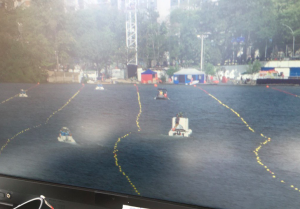
Middle of the course awry. Wind and waves are creating havoc on the Olympic Rowing Regatta
Rowers have joked in the past that God must be a rower. More often than not, Olympic Rowing conditions have been consistently excellent.
There have been short delays here or there but it’s been a long time since an Olympic regatta has been so wind effected. And – I think the last time one was SO disrupted it wasn’t even the Rowing regatta – it was the Canoe Kayak regatta in Sydney (2000). The two sports share a venue; Rowing is always week one and Canoe/Kayak is week two.
I’ll never forget watching the Canadian Flag Bearer, Caroline Brunet, and gold-medal favourite – be forced to race her K1-500m final in conditions that seemed to fit the white-water paddlers far more than the sprint/flat water paddlers. https://www.youtube.com/watch?v=glUKGWFJKJA
People were furious, why wouldn’t that international federation and the IOC delay until conditions improved? They couldn’t – the Closing Ceremony would start in a few hours; all sports had to be completed.
I believe FISA, the international rowing federation, took a long look at that situation and made a decision to give rowing some flexibility if that were to happen in (their) week one.
Rowing used to begin on Sunday – day 3 of the Olympics – and the regatta finished on Sunday with Canoe Kayak beginning the next day. That gave rowing no ‘wiggle’ room to reschedule. FISA changed that. Now the Olympic Rowing Regatta begins on day 2 – the morning after the Opening Ceremony – and should be completed on the Saturday. This gives the venue a day to convert from rowing to canoe/kayak, but also it gives FISA a chance to find best conditions.
I would suppose that as far as FISA and their Fairness Committee are concerned – this week is a nightmare. Delays are hard on everyone. Athletes have been trying to peak perfectly for a moment in time for years, friends families and fans have spent a lot of money are trying to make sure they’ve the right ticket on the right day, TV networks are trying to juggle how to show everyone everything and FISA needs to figure out how to keep racing fair. (I’ve heard that on-line ticket systems are not co operating well with ticket exchanges. I can only imagine the exhaustion and stress that loved-ones are going through as they pass the “off” days trying to change their tickets (regatta and sometimes airline tickets and hotel bookings too) to the next right one.
I know that FISA study weather patterns – daily and long range – and I wouldn’t be surprised if they have found themselves between a rock and hard place. FISA isn’t responsible for the weather – the best they can do is stay as connected to the expert weather forecasters and look for windows of opportunities. (I have to admit – I often joke the weather forecasters and pollsters seem to be the only people who keep their jobs even though their predictions are so often way off).
Saturday morning’s conditions were terrible – but the week at a glance wouldn’t have given FISA much hope for consistent improvement. Should they have postponed the first day? I read on Sunday, and FISA would have known, that Wednesday and Thursday were supposed to be really bad. (Wednesday has in fact started off with a postponement.) So what were they to do? There are only so many days they can push forward to.
Heats are important, but in light of the continued bad weather – I’m glad that FISA didn’t delay into precious blocks of better racing weather. All other rounds are knock-out rounds and FISA needs to protect those.
The new schedule with 4 days of finals also gives FISA increased flexibility. This new Olympic and World Championship race schedule sets up relatively short days. So even when they merged 2 days on Monday– it was just a 5-hour schedule. FISA can use the afternoons and, worst case-scenario they have Sunday as a reserve day.
Being forced to use Sunday would be FISA’s and the IOC’s worst-case scenario. For the athletes, worst-case scenario would be racing for their Olympic dreams in white-caps, cross winds and/or unfair lanes.
No one dreams that.
Tweet
August 9, 2016
After 4 days of Racing in Rio – More of My Thoughts on Canada at the Olympic Rowing Regatta
Posted in What I'm thinking (Thoughts and opinions)
Tweet
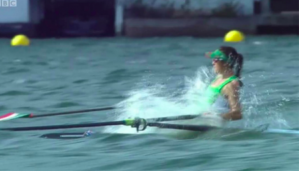
Hard to call this Olympic Racing – and certainly not rowing
Well really… After 3 days of Racing because there was a postponment
(and; just 2 days if you don’t count that big surf day as a real racing day… )
If we look back to the “1 pretty sure and 3 maybes” I wrote about before the regatta began Canada is performing to form with the exception of the men’s quad. What a heartbreaker, and to be specific – I’m talking about Rob Gibson’s heart. Unfortunately I think it might be shattered right now – and I can’t blame him (it?).
I’ve often said that the quad event is the most technical. 4 guys, 8 hands and 8 blades moving at the speed of an eight. If you’re on it – it’s magic; if it gets ahead of you – you’re in for trouble. The conditions on Saturday morning were horrendous. Sadly – all lanes were equally horrendous so the FISA Fairness Committee was slow to act; it wasn’t rowing – but it was fair. The Canadian quad was behind, but was absolutely moving into a position that would have given them a pass into the finals and a shot at the medals. In a flash moment that every rower has nightmares about – Rob Gibson lost his grip on one of his oars. It’s understandable – he was sweaty= slippery, he was soaked by the waves = slippery, and he was in the last few 100m of the race = tired hands = slippery. He lost it, it spun around, he couldn’t get it back and they dropped to last position. That was tough to watch.
The heartbreak came in their repechage. Anyone would have told you at the start that it was still going to be a hard fought race. The event has very few entries and that results in a very tight field (no weak ‘filler’ nations). I’m not there – but what I saw on TV was that when Canada was not in a leading position going into the ½ way mark (1000m) Rob tried harder. It was subtle but there was a difference between his bodywork and bow’s bodywork. While Kia Nurse can dig down and do more as an individual for her women’s basketball team, that sort individual rise up doesn’t work in rowing unless your crew goes with you. The result of an individual rower trying to do more for their crew has the result of pressing your foot onto the brake. I saw intensity go up – and speed go down. I’m so sorry about it. I’m kind of tearing up just writing this.
Now – Jennerich and Obee – I pitched them as killer sprinters in the last 500m. It was a nice surprise to see them attack the first 1500m with a pace that put them in a position to own the top progression spot without even needing to press their “go nuclear” button. With gas in the tank, and an ace up their sleeve (that everyone knows about) they move to their semi-final tomorrow morning. With any luck the crap weather that is once again predicted will hold off. It’s almost impossible to hit your top gears in really choppy water.
The women’s eight surprised me – or maybe they just surprised my biased hopes for them. How can I not think that the Canadian women’s eight always has a medal in them? I have to believe! They struggled more than I expected in their heat; it didn’t look as if they had any ability to really gear up and challenge. Did they need to? Maybe not – As soon as they knew they weren’t winning the heat they could chill until the rep – but I know Lesley and she wouldn’t give away a win if she thought they could take it. They will advance to the Olympic final because the late entry Australia (a result of the Russian doping scandal) just isn’t there, but when they get to the final – they are going to have to find a turbo booster to get on the podium.
The men’s four races their semi-final tomorrow. Sometimes I think the drama in a semi is higher than in the final: Desperation lifts some crews and destroys others. The cut line between 3rd and 4th changes everything; you get to the final or you don’t even have a shot. Coupled with the epic physical battle that accompanies every race at this level, the Canadian four will have to keep their heads and efforts together. If they want to advance to the final they’re going to have to go through the emotional battle of a semi first.
Now on to the crews who I didn’t tap with even a maybe – my apologies for omitting the women’s pair. They are young, but that doesn’t mean they didn’t come into racing in Rio without ambition. This combination had its first ever international race in their heat, so in dealing with everything the Olympics can throw at them – they did a great job. I look forward to watching their young rowing careers progress.
Women’s single – I think Carling Zeeman can make the final. She is young and strong and some of her races show really great promise. But the young part is working against her here… she isn’t yet channeling enough (quiet) confidence and, dare I say – swagger to own the top spots consistently. A rower liked Zeeman, ranked 4-8, can be at the mercy of the draw. Coming in 3rd in the repechage is going to cost her. If she’d won or had been 2nd in her rep the next draw could have worked more in her favour. Now she needs to hope for a lucky draw and a doable semi final. She’s going to need the race of her life to make the final – and then to get on the podium – she’ll need another. Go Carling Go!
The men’s lightweight four – These guys have a lot of heart but they are racing in an event that is usually so tight between 1st and 9th that advancing into the semi’s requires talent, speed, fitness and, again, if you’re not in the top 4… luck of the draw. Everyone outside of the top 4 might find themselves in a progressing round needing the race of their life just to proceed. I hope they are extraordinarily proud of being Olympians, and… they have fire to follow their next ambition – Tokyo or other.
Tweet
August 4, 2016
1 Pretty Sure and 3 Maybes for Canadian Rowers in Rio – my picks
Posted in What I'm thinking (Thoughts and opinions)
Tweet

Lagoa Rodrigo de Freitas, this gorgeous photo of the Olympic Rowing Venue was on the USRowing twitter feed
Olympic Rowing begins tomorrow and while I’m not going to be on the shores of the Lagoa in Rio, it doesn’t mean I don’t have an opinion on how Canada is going to do!
Today, the crews are all waiting to start which is often the hardest part of the regatta. They have had these Olympic races in their hearts and minds for years. Crews haven’t raced for weeks – many since the Lucerne World Cup 10 weeks ago – and can only hope that in training they have made more positive changes than their competitors. For all the drama the World’s press want to focus on … the athletes have a laser focus on the task of chaining approx 220 of their best strokes together, covering the 2000m course faster than anyone else. But now – there is nothing to do but lightly paddle their boats over the course and wait. It’s an exciting and terrifying time.
What do I expect for Canada? I’m pretty sure about 1 medal – and I think there is a shot at up to 3 more. So 1-4 medals; or none It’s the Olympics!
I wish I could say the “pretty sure” bet was going to be the women’s 8 (W8+) with Lesley Thompson-Willie at the helm (the cox, and my team mate on the 1992 Team!) but sadly they have been racing outside of peak form. They just haven’t found the rhythm that makes their boat sing.
To get on the podium they are going to have to work pretty hard to defeat Great Britain and New Zealand for silver or bronze, but the Dutch and Aussies must have the same plan. It’s hard to say it – but the USA will have to make a massive mistake to not take the top spot … again.
The draw – which FISA has just posted as I write this – shows us that we’re going to learn A LOT!! about the Can W8+ really quickly. They’ve drawn a 3-boat heat on Monday; Canada, Great Britain and New Zealand, where only the fastest boat gets a direct route to the Olympic final and the other two will have to duke-it-out in the repechage (2nd chance race). That start-line is going to be a heart-stopping, breath-holding, OMG-ing moment for all 27 athletes because unlike the other heat that will be won by the USA, someone here has a chance to skip the repechage that will eliminate someone from the Olympics.
My “pretty sure” they’ll win a medal tap goes to Canada’s women’s’ lightweight double. They could easily be considered the favourite to win this event – but their racing style is just SO volatile and dramatic that it’s hard to bet on. If Lindsay Jennerich and Patricia Obee win the Gold medal, it will be an incredible made-for-TV event. These rowers don’t tend to find world-leading form until the last 350m of the race, which for many rowers is just WAY TOO LATE! It’s heart stopping if you’re in their cheering section. It’s not unusual for Jennerich and Obee to be “open water back”, in last place with ¾ (1500m) of the race completed to then fight their way to the front, crossing the finish line first.
{Open water back means that there are crews ahead by a full boat length and then some. In almost every boat class, a boat length equals about 3 seconds; an eight is the longest boat but moves the fastest covering a boat length in about 3 seconds. A single is the shortest boat and moves “less-fast” covering a boat length in aprox 3 second. So – racing in a position of “open water back” means you’re behind by over 3 seconds, and if there is only about 350m to go… you’ve only got about 1 minute to make up a lot of time… }
Jennerich and Obee have shown time again that they have the belief in each other and their final sprint that they can make this happen. I believe if there is a head wind (a long, slower race) … they will probably win. If there is a tail wind – which means the last 350m will happen faster— I don’t know if they will have enough time to power through the field.
So – If there is little to no wind… be ready with the defibrillators! It will be a heart stopper to see how much they can recover on some very talented boats.
Their first race is on Sunday. They would like to be one of the first two boats so that they can go directly to the semi-finals, avoiding the repechage (rep). These athletes are pretty professional with their weight so an extra day of weighing in isn’t so terrible… but it’s always an advantage to skip the rep. and have more recovery on their way to the final. Let’s watch the wind and see how they move through the middle 1000m (from 1500m – 500m).
Canada’s other two best shots come from the heavyweight men; the men’s quad (M4x) and the men’s four (M4-). Both of these boats are close in a tight field, which means anything can happen. If they find themselves totally in the right space with the right groove, I can see either of these crews winning a bronze medal which, I’m sure Rowing Canada would heave a sigh of relief! They made the decision 4 years ago to break up the men’s eight which is 9 guys and one shot at a medal and go for a number of smaller boats; now 8 guys going for two medals.
A quad is an extremely technical boat and fast, tail-wind conditions always serve to make it exponentially harder. The Canadian men are rowing it very well – but I think their best chances come with just a little bit of head wind. Last year they got rowed down in the last 500m of a couple of races, and I don’t think this was because they were running out of gas as much as because they just weren’t as efficient as the other crews. Canadians just don’t have sculling in their DNA as much as the Europeans. A slight head wind would really level the field technically and bring out the strength, fitness and determination of the Canadians. (Yes – all crews at the Olympics have this – but these will be the Canadian M4X’s strengths).
The M4x races on Saturday – and it’s easy to say it will be an extremely close race across all 5 lanes. Canada needs to be in the top 2 to advance directly to the finals and avoid the rep.
I think the opposite might be true of the men’s four (M4-). They need the conditions to take size out of the game (or at least equalize it) so they can really capitalize on being feisty. This “True North Four” as they have dubbed themselves can thrive, I believe in perfect conditions. Their first race, a 4-boat heat with 3 to advance is exactly the kind of hurt-locker kind of race they can really sink their teeth into IF THEY KEEP THEIR SWAGGER TOGETHER! The thing with a race like this is that you go into it, with the thought “anything but last” in the very back of your mind. If you’re not careful that can lead to panic. Panic leads to lack of unison and that equals slow. Of course in the front of your mind is “We’re winning this!”
The “anything but last” motivation is what makes the Olympics SO compelling to watch. It will bring out the desperation to achieve… and if you can harness that AND keep your technique and unison – well… then you can go pretty far and fast at the Olympics!
This is the OLYMPICS! The consequence is so high and the performances are so compelling! I’ve been to 6 of the last Olympic Rowing Regattas and there hasn’t been one where all the favourites won. I don’t even think most of the favourites win. There is always an underdog, a crew that no one saw coming who had enough faith in themselves to make their Olympic Dreams happen. I’m going to be glued to my set… wishing for the very best – the very best races – for Team Canada.
Go Canada Go!
W1x Starts racing on Saturday – In this high volume field, Zeeman needs to be top 3 to advance to the quarter-finals. This is a very winnable race for her. Depending on how the later rounds/draw plays out – getting into the Olympic Final will be a challenge, but if she gets there it will take a dream race to put her on the podium. Carling Zeeman is a rookie Olympian and is in a position to become a real player in this event going forward.
LM4- Starts racing on Saturday – This event is always deep and tightly contested. Unfortunately Canada hasn’t really shown that they can put themselves into a big final … but it’s the Olympics and there is a reason they don’t mail out the medals before the start of the race!
M4x Starts racing on Saturday
LW2x Start racing on Sunday
M4- Starts racing on Sunday
W8+ Start racing on Monday
Tweet



